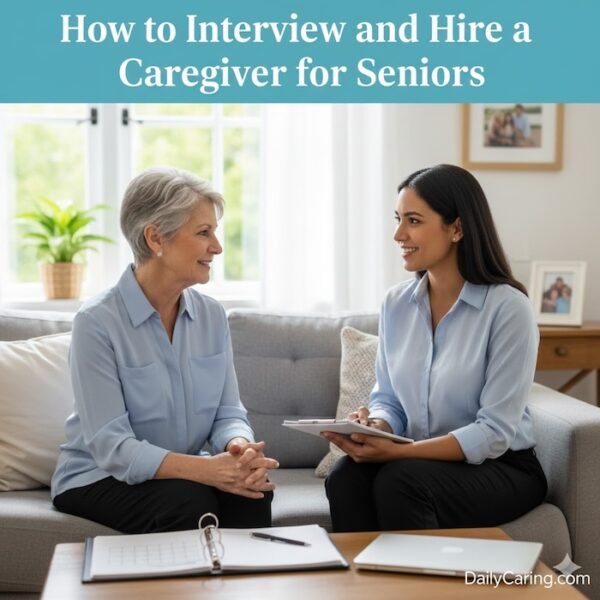Hiring a caregiver is one of the most important and emotionally charged decisions you’ll make for an aging loved one. It’s about inviting a stranger into your family’s most private space and trusting them with your parents’ safety, dignity, and daily comfort.
The pressure to find the “perfect” person can feel overwhelming, but equipped with the right questions and a straightforward process, you can move from anxiety to confidence. Let’s turn this daunting task into a structured, thoughtful search that leads you to a compassionate, capable partner in care.

When hiring a caregiver for your older adult, a thorough and effective interview is essential. Janelle Leavell from CareVine shares eight steps to help you navigate the caregiver interview process, from preparing beforehand to evaluating candidates after the interview.
Many people find themselves in need of a compassionate, experienced, and reliable caregiver for their loved ones.
When hiring a caregiver for private care, conducting a thorough and effective interview is essential.
It can be an involved process, but it is necessary to ensure your loved one's safety, comfort, and happiness.
By adequately preparing, asking the critical questions, and carefully evaluating each candidate, you can find a great caregiver to support your loved one.
This guide has eight steps that help you navigate the process of interviewing a caregiver, from preparing beforehand to evaluating candidates after the interview.
Eight Key Steps for Interviewing a Caregiver
1. Understand the Care Needs of Your Loved One and the Skills of the Caregiver Job Candidate
Before diving into the interview process, take some time to consider your older adult’s specific needs.
Make a list of the services and tasks you expect the caregiver to perform, such as bathing, dressing, meal preparation, medication management, and companionship.
Determine any special skills or certifications that are important, such as dementia care or mobility assistance.
2. Make a List of Interview Questions for the Caregiver Candidates
Develop a set of interview questions that cover a range of topics, including the caregiver's experience, qualifications, and personal traits.
Some questions to consider asking include:
- Can you provide references from past clients or employers?
- What caregiving certifications or training do you have?
- What types of care have you provided to your previous clients?
- How have you handled emergencies or difficult situations?
- How do you ensure the safety and well-being of your clients?
- What is your approach to providing companionship and emotional support?
- What do you consider as your caregiving weaknesses and strengths?
Use these questions as a starting point. Tailor your questions to suit your loved one's specific care needs, personality, and preferences.
3. Ask Scenario-Based Questions When Interviewing a Potential Caregiver
Develop scenarios that are relevant to your loved one. During the interview, ask how they would handle the situation.
Some examples of questions you might ask include:
- The person you’re caring for has a fall. What would you do?
- The person you’re caring for is upset with you. How would you handle the situation?
- The person you’re caring for is exhibiting unusual symptoms, such as confusion, weakness, significant pain, swelling, etc. What would you do and who would you contact?
- The person you’re caring for is trying to do things without help, but this isn’t safe. How would you handle this?
4. Conduct a Thorough Background Check of the Caregiver Candidate
A caregiver will have a significant impact on the life of your older adult, so it's crucial to ensure they have a clean background.
Conduct a thorough background check, including checking references from past employers or clients, the validity of professional licenses, criminal records, abuse registries, and driving records.
This will help ensure the safety and security of your loved one.
5. Evaluate the Candidate's Communication Skills
Effective communication is crucial in caregiving because caregivers need to understand their loved ones' needs, preferences, and concerns.
During the interview, pay attention to how the candidate communicates.
Are they patient, clear, and empathetic? Do they listen actively and ask thoughtful questions?
Evaluating these skills will help ensure a successful caregiving relationship.
6. Assess the Personality Fit Between Caregiver and Care Recipient
Compatibility between the caregiver and your loved one is essential for a positive caregiving experience.
During the interview, consider whether the candidate's personality and approach to caregiving align with your older adult's preferences and values.
For example, assess whether they are a bubbly, high-energy person or a quieter, more gentle individual, and which would better fit your loved one’s needs.
Ask about their personal caregiving philosophy, hobbies, and interests to help gauge compatibility.
7. Discuss Compensation and Scheduling with the Caregiver Job Candidate
It's essential to discuss compensation and scheduling expectations upfront.
Be transparent about your budget, and ask the caregiver about their desired salary or hourly rate.
Discuss any scheduling requirements, such as overnight shifts or weekends, to ensure the candidate is comfortable with the proposed arrangement.
8. Conduct a Post-Interview Evaluation to Take Notes and Gather Your Thoughts
After each interview, take some time to evaluate the candidate. Consider their qualifications, experience, communication skills, and personality fit.
If possible, discuss with your loved one and listen to their thoughts and preferences.
Take your time when making a decision, because finding the right caregiver is crucial to your loved one's well-being and your peace of mind.
Final Thoughts on Interviewing Potential Caregivers
Finding the right caregiver is more than filling a job opening; it’s about building a trusted relationship that brings peace, support, and companionship into your loved one’s life.
By taking a thorough, heart-led approach to the interview process, you’re not just vetting qualifications—you’re ensuring a genuine human connection and a shared commitment to well-being.
Trust the process, listen to your instincts, and remember that this careful investment of time will pay off in priceless security and relief for everyone involved. The right person is out there, and you now have the map to find them.
Recommended for you:
- Affordable Home Care: 8 Ways to Lower Senior Care Costs
- Home Health Care vs Home Care: What’s the Difference?
- 7 Steps for Hiring a Caregiver for In-Home Help
Guest contributor: As a former home health physical therapist, Janelle Leavell often saw seniors who could no longer safely remain in their homes without assistance but still desired to live in a home-like environment. To address this, she opened her first senior care home in Salem, OR, in 2008 and has since opened multiple others. In addition to operating the care homes, Janelle is now focused on building CareVine. This platform connects seniors with private caregivers, enabling them to continue living in their homes while receiving the assistance that fits their specific needs.













